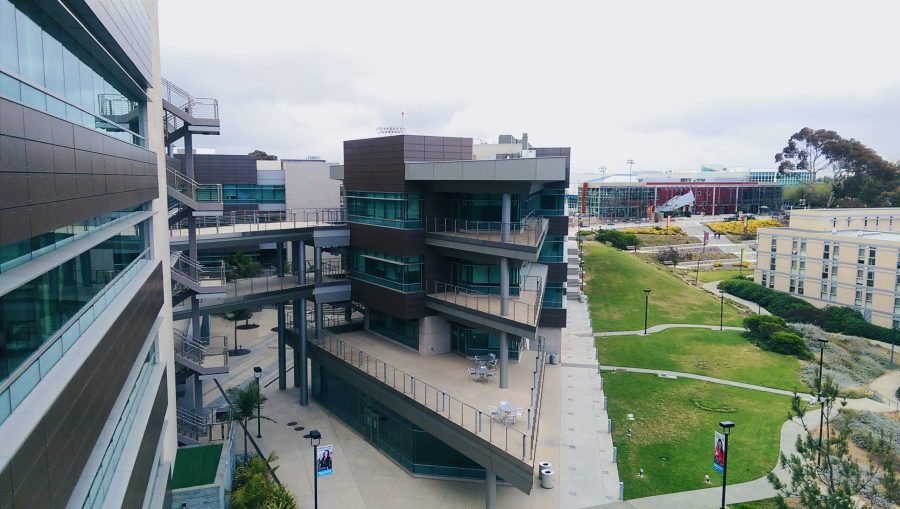Among other proposals, the University of California Board of Regents discussed implementation of a multi-year cohort-based tuition increase during the Regents meeting on May 13. The cohort-based tuition model would mean that increases in tuition only apply to incoming students, and the charged amount would stay flat for that cohort during their time at UC.
If approved, first-year undergraduates enrolling in Fall 2022 will see a 2-percent raise in tuition charges plus inflation, which equates to $642 for California residents. The percentage increase would be smaller for subsequent cohorts; new students entering UC in Fall 2025 would be the last cohort to have a tuition increase. The current estimated tuition for California residents at UC San Diego is $14,733.
Source: Proposed Schedules of Student Charges
This proposal will not affect graduate students, whose tuition and fee will stay flat at the 2021–2022 levels plus inflation. Students who defer their enrollment will likely be able to sign a waiver allowing them to keep their cohort’s tuition.
According to the Regents, between a 20 year time period from 2000 to 2020, student enrollment increased by 67 percent while the funding for students decreased by 33 percent. UC President Michael V. Drake said that this is not a sustainable model.
“Our campuses have made painful compromises when it comes to the programs and services that are offered, students are often born with the burdens of these compromises,” Drake said in the meeting. “This [tuition action] has been a multi-year discussion, but it’s important to provide cost predictability, enhance student support and preserve UC excellence.”
In January of 2021, UC Chancellors including Chancellor Khosla of UCSD reportedly considered increasing tuition to mitigate the financial impact that the system faced because of the pandemic. Although it never went through with the decision, UC has expressed a desire to increase its funding amidst rising costs.
As the impacts of the pandemic will continue to persist in following years, UC Berkeley Chancellor Carol Christ said that the current efforts will not be enough for the campus to return to a balanced budget without an increase in tuition over time.
“Keeping base tuition nearly flat since 2011–2012 has created a great challenge for the campus,” Christ said during the meeting. “We have moved well past the point of belt-tightening to the extent that our staff and faculty levels can not be further reduced without threatening our academic core, our excellence and the ability for our students to thrive.”
Many financial aid packages provide low-income students with tuition assistance and coverage for additional student costs such as housing, books and transportation. 56 percent of UC in-state undergraduates have their tuition and fees fully covered through federal grants and state-funded Cal grants. According to Drake, full coverage would continue under the proposal.
According to UC Board of Regents Chair John A. Pérez, the pool of available financial aid money has not kept pace with other non-tuition costs.
“Tuition has been flat, financial aid has been flat…so the unmet need for students has grown because the base by which we get financial aid has not kept pace with the non-tuition related cost,” Pérez said. “Students have had to take on more work, more debts or experience unmet basic needs because the pool of money available for financial aid has not kept pace with the total cost.”
Vice Chair of the Board of Regents Cecilia Estolano argued that cohort-based tuition will mainly affect the students who will need to pay for the tuition out of pocket and will enhance equity.
“If we are going to educate a body of undergraduates that looks like and mirrors the composition of California’s population, which is poor, working class, people of color, first generation, we actually need to invest in all of it that makes them have an excellent education,” Cecilia Estolano said. “And the way to do it is essentially a progressive tax…You are gonna charge affluent people a bit more…and in exchange, everybody will have the faculty and staff ratio that they expect, everybody will get access to services at the level they should expect; mental health, counseling, and other support services.”
In March 2020, the Board of Regents had proposed a five-year plan to increase undergraduate tuition starting 2020-2021 academic year but the vote was postponed due to the pandemic.
California Governor Gavin Newsom has previously rejected tuition increases for the UC and Cal State university systems and argued that the state needs to focus on improving student aid.
Newsom instead invested $136 million to provide a 3-percent increase in the base funding for the two public university systems in his 2021–2022 state budget proposal. However, according to the Los Angeles Times, the suggested increase is not sufficient to offset the financial costs California university systems experienced over the pandemic.
In the May revision of the governor’s budget proposal, the higher education expenditures on UC will increase 13.5 percent compared to 2020–2021. The update on May revision was not discussed in the meeting as planned, but the proposal is expected to be enacted in summer after the approval of the Legislature and governor.
The UC Regents meet 1-2 times a month to deliberate executive decisions pertaining to the UC system. Information on future Regents meetings can be found on their website.
Photo courtesy of Hazel Leung for The UCSD Guardian.















Veronika • Aug 1, 2021 at 8:53 am
An increase in tuition fees is always unpleasant news for students, especially if they already had problems with payment. Federal student loans give you special opportunities, but I still advise you to study more information about this before
Emma • Jul 21, 2021 at 7:06 am
A real property agency will be able to give a complete analysis of the chosen property and tell about its pros and cons, because there are many different subtleties that a simple man in the street, not being a professional, sometimes does not even think about.